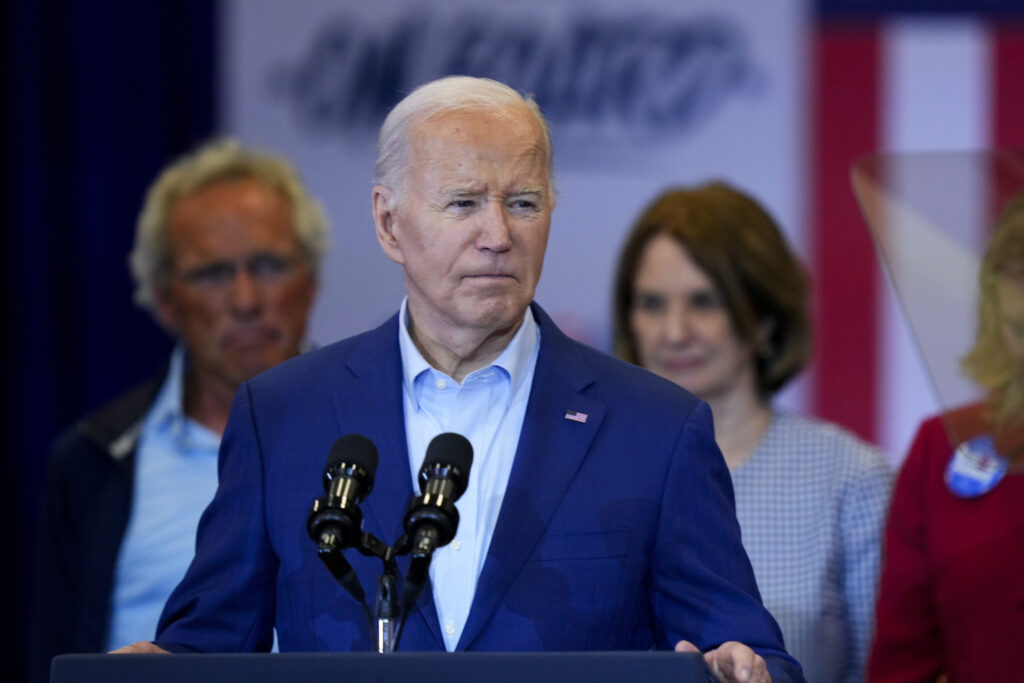GOP Slammed Biden’s Voting Order as Federal Overreach — But Praised Trump’s

When then-President Joe Biden issued an executive order in 2021 aiming to turn federal agencies across the country into voter registration hubs, Republicans were outraged.
Perhaps the most prominent charge they leveled against the order was that it amounted to extreme federal overreach. In press conferences, congressional hearings, and lawsuits, Republicans portrayed Biden’s initiative as a Washington power grab that encroached on states’ constitutional authority to run their own elections.
“States play the primary role in conducting elections, with Congress playing a vital— but carefully circumscribed — secondary role,” a group of elected Republicans including Ohio Secretary of State Frank LaRose wrote in a lawsuit challenging the order’s constitutionality. “Moreover, the limited role for the Federal Government in elections is vested in Congress alone, not the President acting unilaterally without congressional authorization or appropriation. No statute passed by Congress authorizes the EO, and the President has no inherent constitutional authority to issue it.”
President Donald Trump issued his own executive order on voting Tuesday. By any measure, it encroaches on the authority of states to run elections far more directly than did Biden’s. While Biden’s order merely directed federal agencies to find ways to offer voter registration services, Trump’s aims to coerce states to change their rules for accepting mail ballots, and empowers Elon Musk’s Department of Government Efficiency to subpoena state records to prove voter fraud, among other steps.
The LaRose lawsuit was withdrawn by the plaintiffs in February after Trump rescinded Biden’s order. A separate GOP lawsuit against Biden’s order was rejected by a federal judge last year.
The Trump measure, wrote the election law scholar Rick Hasen, “would severely shift power over federal elections into the hands of the Presidency.”
But LaRose had a different response this time. He praised Trump’s “decisive leadership to protect the integrity of our elections,” and welcomed “clear standards on election administration.”
Ohio’s chief election official was far from the only Republican who was deeply concerned about states’ rights in response to Biden’s order, but seemed to forget about those concerns when it came to Trump’s.
Joining LaRose as a plaintiff in that same lawsuit that accused Biden of overreach was the Trump-aligned think tank America First Policy Institute (AFPI). But on Wednesday, Ashley Hayek, the group’s executive vice president, cheered Trump’s order.
“President Trump delivered on his promise to the American people to safeguard our election system for generations to come,” Hayek said.
Likewise, Indiana Secretary of State Diego Morales (R) sent a letter last year to federal agencies in his state warning them against implementing Biden’s order.
“States know best when it comes to our elections,” Morales wrote. “We don’t need federal government overreach to run safe, secure elections!”
On Wednesday Morales called Trump’s order “common sense and long overdue,” and pledged to “work to ensure Indiana is in full compliance.”
Hans von Spakovsky, the Heritage Foundation’s longtime voting expert and a leading advocate of stricter voting rules, authored a report last year on the evils of Biden’s order, which it called “unlawful interference in state election administration.”
On Wednesday, von Spakovsky said of Trump’s order:
“President Trump is finally taking the action long needed to put the resources of federal agencies like the Departments of Homeland Security and Justice to work helping states, instead of trying to hinder their efforts to reform our election process, which was an unfortunate hallmark of the Biden administration.”
Spokespeople for LaRose, Morales, and AFPI didn’t respond to inquiries about how the overreach charge could apply to Biden’s order but not Trump’s. Von Spakovsky also didn’t respond to an inquiry made through the Heritage Foundation.
Other Republicans who portrayed Biden’s order as dangerous federal interference have simply gone quiet in response to Trump’s.
In a 2022 letter to Biden, a group of Republican state attorneys general, including Texas’s Ken Paxton, Alabama’s Steve Marshall, and Louisiana’s Jeff Landry, called his order “unconstitutional overreach by the federal government.”
None of the letter’s signers have expressed any concerns about Trump’s.
Of course, it’s hardly news that anti-voting politicians are driven more by raw partisanship than by high-minded principles. But it’s worth highlighting every time they demonstrate it.